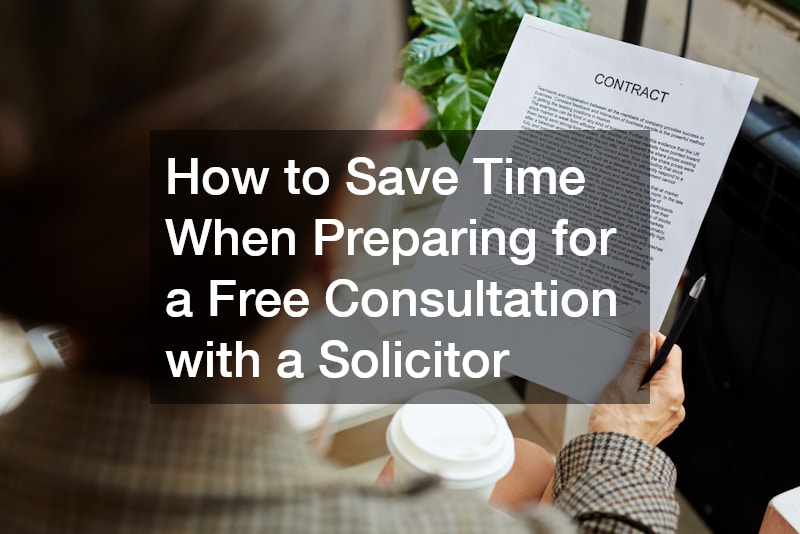A free consultation with a solicitor can provide invaluable guidance to help you understand and navigate your legal situation. Preparation is crucial to maximise the value of this meeting, regardless of whether you are consulting with a personal injury solicitor, family law expert, or traffic lawyer. By being well-prepared, you can ensure that your solicitor has all the necessary information to provide accurate advice and explore the best course of action.
Proper preparation not only streamlines the consultation but also allows you to evaluate whether the solicitor is the right fit for your needs. This applies to all types of legal professionals, from estate lawyers to workers’ compensation solicitors. A well-prepared meeting also demonstrates your commitment to resolving the matter effectively.
Collect All Relevant Documents in Advance
Gathering all pertinent documents before your consultation is an essential first step. This ensures that your solicitor can fully understand your situation and provide tailored advice. For instance, if you are dealing with a personal injury claim, documents such as medical records, police reports, and photographs of the incident may be essential. For estate planning matters, your solicitor may need to review wills, trusts, or asset inventories.
If you’re meeting a traffic lawyer, bring copies of any tickets, correspondence with authorities, or related evidence. Similarly, in family law cases, such as custody disputes, relevant documents might include court orders, communication logs, or financial records.
Organising these materials ahead of time saves both you and your solicitor valuable time. It also allows the solicitor to focus on analysing your case and exploring potential strategies, which can make the consultation more productive.
Understand Your Case Timeline and Key Details
Understanding the timeline and details of your case is another critical aspect of preparation. Take the time to create a chronological summary of events, including dates, times, and key actions. For instance, in a workers’ compensation claim, outlining the sequence of events from the injury to the current status can help your solicitor understand the urgency and nuances of your situation.
This timeline is especially useful in complex cases such as personal injury claims, where the order of events can significantly impact the legal strategy. Similarly, if you are dealing with criminal charges like petty theft, knowing the timeline of events can assist your solicitor in forming a strong defence.
By clearly presenting the sequence of events, you provide your solicitor with a comprehensive overview, enabling them to assess your case more efficiently.
Prepare a Clear Summary of the Incident or Issue
Having a concise but thorough summary of the incident or issue is essential for a productive consultation. This summary should include all relevant facts, key players, and circumstances without unnecessary embellishments. For example, if you’re consulting with a solicitor about a slip-and-fall injury, describe exactly what happened, where it occurred, and any contributing factors, such as hazardous conditions.
This preparation allows the solicitor to focus on the critical aspects of your case right from the start. Whether your matter involves estate planning, a traffic offence, or criminal charges, a clear summary ensures that your consultation stays on track and addresses the most pressing concerns.
Prepare Questions in Advance
To get the most out of your consultation, prepare a list of questions to ask your solicitor. These questions might include:
- What is your experience with cases like mine?
- What strategies would you recommend for my situation?
- Are there potential challenges I should be aware of?
- What are the expected costs and payment options?
By addressing these questions, you can better understand the solicitor’s expertise, approach, and expectations. This is particularly useful if you are consulting with multiple solicitors to find the best fit.
Clarify Your Goals for Legal Assistance
Understanding your goals for the legal process is essential. Whether you are seeking a settlement, reduced penalties, or legal protection, having clear objectives helps guide the consultation. For example, in personal injury cases, you may aim for compensation that covers medical expenses and lost income. In estate planning, your goal might be to establish a comprehensive will or trust.
Discussing your goals with your solicitor ensures that they understand your priorities and can tailor their advice accordingly. Clear communication also helps manage expectations and reduces the likelihood of misunderstandings.
Bring Financial Records if Relevant
Financial records are often crucial in legal matters, particularly in cases involving bankruptcy, estate planning, or compensation claims. Bring documents such as bank statements, tax returns, and financial agreements to your consultation. These records can help your solicitor understand your financial situation and assess how legal proceedings may affect your assets.
For example, in a personal injury case, financial records might demonstrate the economic impact of the injury, such as lost wages or ongoing medical expenses. In estate planning, these records provide a clear picture of your assets and liabilities, enabling the solicitor to develop a tailored plan.
Research Your Legal Issue
Before your consultation, take the time to research the basics of your legal issue. Familiarising yourself with relevant laws, terms, and processes can help you communicate effectively with your solicitor. For instance, understanding the basics of workers’ compensation law can provide context for discussions with your solicitor about a workplace injury.
This preparation shows your commitment to the case and can lead to more meaningful conversations during the consultation. It also allows you to ask informed questions and better understand the solicitor’s advice.
Be Honest and Transparent About Past Legal Issues
Transparency is crucial when consulting with a solicitor. Be upfront about any past legal issues or relevant history, even if you think it might not be directly related to your current case. For example, if you’re consulting a traffic lawyer about a recent infringement, disclose any prior offences that could impact the outcome.
Being honest about your legal history allows the solicitor to provide realistic advice and anticipate potential challenges. Transparency is particularly important in cases involving criminal charges, custody disputes, or financial insolvency, where past actions can significantly influence the outcome.
Organise Medical or Repair Bills for Injury-Related Cases
If your legal matter involves an injury, compile all medical bills, repair invoices, and related documentation. These records form the basis of your compensation claim and can significantly impact settlement negotiations. For example, in a slip-and-fall case, medical records and repair estimates can demonstrate the extent of the injury and the costs incurred.
Providing these documents during your consultation allows your solicitor to evaluate potential damages and explore compensation options more effectively.
Identify Key Witnesses or Supporting Contacts
Identifying and listing potential witnesses or supporting contacts can strengthen your case. Witnesses can provide valuable testimony to corroborate your story, whether you are dealing with a personal injury claim, a workplace dispute, or a custody case.
Consider individuals who were present during the incident or who have relevant expertise. For example, in a workplace injury case, a colleague who witnessed the accident might provide critical evidence. Sharing this information with your solicitor allows them to determine how witnesses can be incorporated into your case strategy.
Familiarise Yourself with Legal Terminology
Learning basic legal terminology can improve communication during your consultation. Understanding common terms such as “plaintiff,” “negligence,” or “settlement” can help you follow your solicitor’s explanations and advice more effectively.
This knowledge not only enhances your understanding of the case but also enables more productive discussions. Familiarity with legal terms is particularly helpful in cases involving complex legal processes, such as bankruptcy or personal injury claims.
Check the Solicitor’s Experience and Specialisation
Before your consultation, research the solicitor’s experience and specialisation to ensure they are the right fit for your case. Look for information about their track record, client reviews, and areas of expertise. For example, if you are dealing with a family law matter, choose a solicitor with substantial experience in family courts.
Asking about the solicitor’s past cases and success rates during the consultation can also provide insight into their suitability for your needs.
Clarify Fees and Payment Structures

Discussing fees and payment structures is an important part of any consultation. Understanding the financial implications of hiring a solicitor helps you plan your budget and avoid unexpected expenses. Ask about hourly rates, retainer fees, contingency arrangements, and any additional costs.
This transparency fosters trust and ensures that you have a clear understanding of the solicitor’s services and associated costs.
By taking these proactive steps, you can ensure that your free consultation with a solicitor is as productive and informative as possible. Preparation not only saves time but also helps you make informed decisions about your legal situation. Whether you are dealing with personal injury claims, estate planning, or traffic offences, a well-prepared consultation sets the stage for a smoother legal journey.
